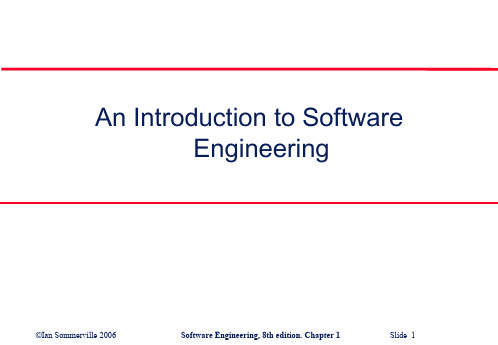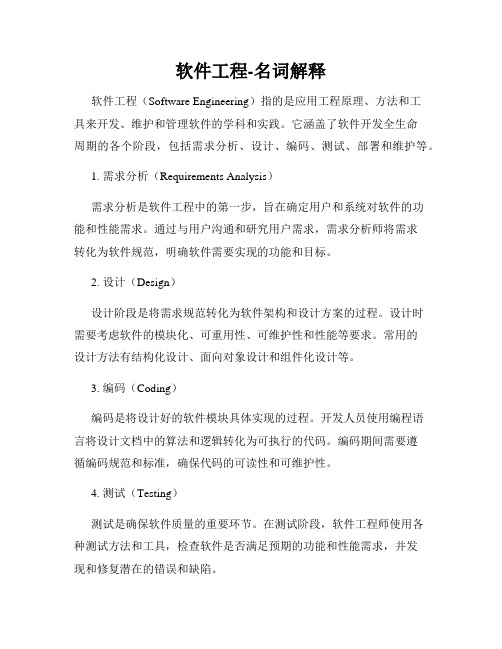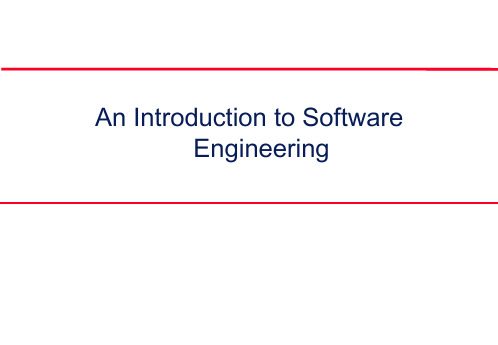Introduction of software engineering
软件工程专业英文介绍PPT

methods and tools for professional software development. Expenditure on software represents a significant fraction of GNP in all developed countries.
An Introduction to Software Engineering
©Ian Sommerville 2006
Software Engineering, 8th edition. Chapter 1
Slide 1
Objectives
To introduce software engineering and to explain le 2006
Software Engineering, 8th edition. Chapter 1
Slide 5
FAQs about software engineering
What is software? What is software engineering? What is the difference between software
©Ian Sommerville 2006
Software Engineering, 8th edition. Chapter 1
Slide 3
Software engineering
The economies of ALL developed nations are dependent on software.
软件工程-名词解释

软件工程-名词解释软件工程(Software Engineering)指的是应用工程原理、方法和工具来开发、维护和管理软件的学科和实践。
它涵盖了软件开发全生命周期的各个阶段,包括需求分析、设计、编码、测试、部署和维护等。
1. 需求分析(Requirements Analysis)需求分析是软件工程中的第一步,旨在确定用户和系统对软件的功能和性能需求。
通过与用户沟通和研究用户需求,需求分析师将需求转化为软件规范,明确软件需要实现的功能和目标。
2. 设计(Design)设计阶段是将需求规范转化为软件架构和设计方案的过程。
设计时需要考虑软件的模块化、可重用性、可维护性和性能等要求。
常用的设计方法有结构化设计、面向对象设计和组件化设计等。
3. 编码(Coding)编码是将设计好的软件模块具体实现的过程。
开发人员使用编程语言将设计文档中的算法和逻辑转化为可执行的代码。
编码期间需要遵循编码规范和标准,确保代码的可读性和可维护性。
4. 测试(Testing)测试是确保软件质量的重要环节。
在测试阶段,软件工程师使用各种测试方法和工具,检查软件是否满足预期的功能和性能需求,并发现和修复潜在的错误和缺陷。
5. 部署(Deployment)部署是将软件交付给用户并在实际环境中运行的过程。
在部署阶段,软件工程师需要进行安装、配置和集成等操作,确保软件在用户系统中的正确运行。
6. 维护(Maintenance)软件维护是对软件进行修改、优化和调试的过程。
维护工作包括纠正错误、增加新功能、改善性能以及适应新的硬件和操作系统等。
7. 迭代开发(Iterative Development)迭代开发是一种软件开发方法,通过将整个软件开发过程划分为多个迭代周期,每个周期都包含需求分析、设计、编码、测试和部署等阶段。
每个迭代周期都能够产生一个可运行的软件产品,同时还可以根据用户的反馈和需求变化进行调整和优化。
8. 敏捷开发(Agile Development)敏捷开发是一种以人员协作、迭代和快速响应变化为核心的软件开发方法。
软件工程的书

软件工程的书以下是一些关于软件工程的经典书籍:1. 《软件工程:实践者的研究方法》(Software Engineering: A Practitioner's Approach) - Roger S. Pressman2. 《软件工程导论》(Introduction to Software Engineering) - Ian Sommerville3. 《软件工程:迭代式增量开发》(Software Engineering: Iterative and Incremental Development) - Craig Larman4. 《软件项目管理实践》(Software Project Management: A Unified Framework) - Walker Royce5. 《计量软件工程》(Software Metrics: A Rigorous and Practical Approach) - Norman Fenton and James Bieman6. 《代码大全》(Code Complete) - Steve McConnell7. 《软件工程:必要知识和技能》(Software Engineering: Essential Skills for Agile Development) - Faithe Wempen8. 《软件工程:经验法则和不断改进》(Software Engineering: Principles and Continuous Improvement) - John R. V. Gray and Natasha Stojcevska9. 《软件维护:概念与实践》(Software Maintenance: Concepts and Practice) - Penny Grubb and Armstrong Natalia 10. 《软件测试和验证》(Software Testing and Validation) - Gary D. Miller这些书籍涵盖了软件工程的不同方面,包括软件开发、项目管理、质量保证和测试等。
软件工程介绍--英文版

Topics covered
FAQs about software engineering Professional and ethical responsibility
Engineering) What are the attributes of good software? What are the key challenges facing software
engineering?
What is software?
Computer programs and associated documentation such as requirements, design models and user manuals.
Software products may be developed for a particular customer or may be developed for a general market.
Software products may be
• Generic - developed to be sold to a range of different customers e.g. PC software such as Excel or Word.
FAQs about software engineering
What are the costs of software engineering? What are software engineering methods? What is CASE (Computer-Aided Software
软工学习资料推荐

软工学习资料推荐软件工程(Software Engineering)是一门研究和应用如何以系统化和规范化的方法去构建、运行、维护和管理软件的学科。
对于软件工程学习者来说,掌握优质的学习资料是非常重要的,它们可以帮助我们深入了解软件工程的理论和实践,提升我们的编程能力和项目管理技巧。
本文将向广大软工学习者推荐一些值得阅读的软工学习资料。
一、软件工程导论1. 《软件工程导论》(Introduction to Software Engineering)- Ian Sommerville这本书是软件工程学习的经典教材,已经成为了许多大学软工专业的教材之一。
作者通过清晰简洁的语言,详细介绍了软件工程的各个方面,包括软件开发过程、需求分析、软件设计、软件测试等。
它不仅适合软件工程专业的学生,也适合其他对软工感兴趣的读者。
2. 《软件工程:实践者的研究方法》(Software Engineering: A Practitioner's Approach)- Roger S. PressmanPressman的这本书是软件工程领域的经典著作之一,对软件开发的整个过程进行了深入的介绍和剖析。
书中包含丰富的案例和实践经验,让读者能够更好地理解软件工程中的实际问题和解决方法。
二、软件需求工程1. 《软件需求工程》(Software Requirements Engineering)- Karl Wiegers、Joy Beatty这本书主要介绍了软件需求工程的理论和实践。
作者通过大量的示例和案例,详细讲解了如何正确地进行需求分析和需求管理,以及如何定义和验证软件需求。
对于从事软件需求工程的工程师和项目经理而言,这本书是一本不可或缺的好资料。
2. 《需求工程:基础》(Requirements Engineering: Fundamentals)- Klaus Pohl、Chris Rupp本书系统地介绍了需求工程的基本概念和方法,帮助读者全面理解需求工程的整个过程。
软件工程英语自我介绍

软件工程英语自我介绍Software Engineering Self-Introduction.Hello, esteemed members of the panel. Thank you for providing me with this opportunity to introduce myself. My name is [Your Name], and I am passionate about software engineering, a field that combines my love for technology with my desire to create solutions that make a difference.My journey into software engineering began when I was a young child, fascinated by the magic of computers and the infinite possibilities they presented. As I grew older, my curiosity led me to delve deeper into programming, and I quickly realized that it was not just about writing code;it was about solving problems, innovating, andcollaborating with others to create something remarkable.During my academic journey, I have had the privilege of studying under some of the most esteemed mentors in the field. My undergraduate studies in computer scienceprovided me with a solid foundation in algorithms, data structures, and software design principles. My postgraduate studies in software engineering took me a step further, focusing on advanced topics like software architecture, project management, and software quality assurance.My work experience has been equally enriching. I have had the opportunity to work on diverse projects, ranging from small-scale applications to large-scale enterprise solutions. Each project taught me valuable lessons in team collaboration, project management, and software development best practices. Working closely with cross-functional teams has helped me develop strong communication skills and the ability to adapt to changing requirements and deadlines.My technical proficiency includes a strong grasp of programming languages like Java, Python, and C++, as well as familiarity with various frameworks and tools like Spring, Django, and Git. I am also proficient in databases like MySQL and NoSQL, and I have experience with cloud computing platforms like AWS and Azure.Beyond technical skills, I believe that my ability to think critically and solve problems is what truly sets me apart. I am passionate about continuous learning and am always eager to explore new technologies and frameworks. I am also a strong advocate of agile methodologies and believe that iterative development and continuous feedback are key to delivering high-quality software.In terms of personal qualities, I pride myself on being a team player who is willing to go the extra mile to ensure the success of the project. I am also an effective communicator, able to bridge the gap between technical and non-technical teams, explaining complex concepts in simple terms.In conclusion, my love for software engineering, coupled with my technical proficiency, problem-solving abilities, and team-oriented attitude, makes me a strong candidate for any software engineering role. I am excited about the opportunities that lie ahead and am looking forward to contributing to innovative projects that make a positive impact. Thank you for considering my application.。
软件工程师 software engineer职位描述与岗位职责
软件工程师 software engineer职位描述与岗位职
责
软件工程师是一种专业技术人员,负责设计、开发、测试和维护计算机软件。
下面是软件工程师的职位描述和岗位职责:职位描述:
作为一名软件工程师,你将负责以下工作:
1. 设计和开发计算机软件,编写代码并进行测试。
2. 理解用户需求,与产品经理合作制定计划和时间表。
3. 针对已有的软件进行维护和优化,确保其持续运行和改进。
4. 参与新技术的探索和研究,为公司的软件开发提供创新性的解决方案。
5. 与其他技术团队协作,确保软件项目能够按计划完成。
岗位职责:
1. 编写高质量的代码,确保软件产品满足用户需求。
2. 设计和实现软件的架构,确保软件满足性能和可扩展性的要求。
3. 进行错误排除和调试,确保软件能够正常运行。
4. 参与代码评审和测试,确保软件质量。
5. 开发文档和用户手册,帮助用户更好地理解和使用软件。
6. 研究新技术和工具,保持在软件行业的领先地位。
7. 与其他技术团队协调工作,确保软件开发和项目实施按计划进行。
8. 不断优化和改进现有的软件,保持软件的竞争力。
总之,作为一名软件工程师,你需要具备扎实的编程技能和计算机科学知识,同时还需要具备团队协作、沟通和领导能力,能够在高速发展的软件行业中不断学习和进步。
软件工程师英语自我介绍
软件工程师英语自我介绍Hello, my name is [Your Name], and I am a software engineer. 你好,我叫[你的名字],我是一名软件工程师。
I have always been passionate about technology and problem-solving, which led me to pursue a career in software engineering. 我一直对技术和问题解决充满热情,这使我走上了软件工程师这条职业道路。
In my previous role, I was responsible for developing and maintaining software solutions for a variety of clients. 在我的上一个岗位上,我负责为各种客户开发和维护软件解决方案。
I was involved in all stages of the software development lifecycle, from requirements gathering and analysis to design, implementation, and testing. 我参与了软件开发生命周期的所有阶段,从需求收集和分析到设计、实施和测试。
One of the aspects of software engineering that I find most rewarding is the opportunity to continuously learn and improve my skills. 软件工程的一个方面,我觉得最有价值的是不断学习和提高自己的技能的机会。
Technology is constantly evolving, and there are always new tools and techniques to explore. 技术一直在不断发展,总有新工具和技术等待我们去探索。
软件技术专业介绍英语作文
软件技术专业介绍英语作文Software Engineering: A Comprehensive Overview.Software engineering is a comprehensive and multifaceted discipline that encompasses the design, development, deployment, and maintenance of software systems. It involves the application of scientific and mathematical principles to the creation and improvement of software, ensuring its efficiency, reliability, and maintainability.Software engineering professionals, known as software engineers, are responsible for transforming user requirements into functional and robust software solutions. They utilize a structured and systematic approach to software development, adhering to well-defined processes and methodologies.Key Concepts in Software Engineering.1. Software Development Life Cycle (SDLC): The SDLC isa comprehensive framework that outlines the phases of software development, from planning and requirements gathering to testing and deployment. It ensures a systematic and organized approach to software creation.2. Software Requirements: Software requirements define the functionality, performance, and other attributes of the software system. They serve as the foundation for software design and development, ensuring that the final product meets the intended needs of the users.3. Software Design: Software design involves creating blueprints for the software system. It defines the architecture, data structures, and algorithms that form the backbone of the software.4. Software Implementation: The implementation phase involves writing the actual code that brings the software design to life. Software engineers select appropriate programming languages and development tools to translate the design into a functional system.5. Software Testing: Testing is a crucial phase that ensures the software meets the specified requirements and functions as expected. Software engineers employ various testing techniques to identify and rectify any errors or defects.6. Software Deployment: Deployment refers to the process of delivering the software to the end-users. It involves creating installation packages, configuring the software, and providing documentation and training.7. Software Maintenance: Software maintenance involves updating and improving the software over its lifespan to ensure it remains effective and meets changing user needs. It includes bug fixes, feature enhancements, and performance optimizations.Importance of Software Engineering.Software engineering plays a vital role in the modern world, underpinning the functionality of countless devices,systems, and applications that we rely on daily.1. Efficiency and Productivity: Software engineering practices promote efficiency and productivity by automating tasks, streamlining processes, and enhancing data management.2. Reliability and Security: Software systems are designed to be reliable and secure, ensuring data integrity and protection from vulnerabilities and malicious attacks.3. Innovation and Growth: Software engineering enables continuous innovation and growth by facilitating the creation of new products, services, and solutions that drive technological advancements.4. Economic Impact: The software industry is a major contributor to the global economy, creating jobs and stimulating growth in various sectors.Career Opportunities in Software Engineering.Software engineering offers a wide range of career opportunities for individuals with the necessary skills and qualifications.1. Software Developer: Responsible for designing, developing, and testing software solutions.2. Software Architect: Leads the design andarchitecture of complex software systems.3. Software Tester: Ensures the quality andreliability of software by performing various testing procedures.4. Software Project Manager: Manages the planning, execution, and delivery of software projects.5. Software Consultant: Provides expertise and adviceto organizations on software development and implementation.Education and Training in Software Engineering.Becoming a software engineer typically requires a formal education in computer science, software engineering, or a related field. Many universities offer undergraduate and graduate programs that provide a solid foundation in software development concepts and practices.In addition to formal education, software engineers must continuously update their skills and knowledge to keep pace with evolving technologies and best practices. Industry certifications and professional development courses can help engineers enhance their expertise and stay competitive.Conclusion.Software engineering is a rapidly evolving field that drives innovation and shapes the modern world. By applying scientific and mathematical principles to the design, development, and maintenance of software systems, software engineers create solutions that empower businesses, enhance our lives, and drive economic growth. The demand forskilled software engineers is expected to continue to riseas technology continues to permeate every aspect of our society.。
软件工程介绍--英文版 共32页
©Ian Sommerville 2006
Software Engineering, 8th edition. Chapter 1
Slide 6
FAQs about software engineering
What are the costs of software engineering? What are software engineering methods? What is CASE (Computer-Aided Software
Slide 7
What is software?
Computer programs and associated documentation such as requirements, design models and user manuals.
Software products may be developed for a particular customer or may be developed for a general market.
©Ian Sommerville 2006
Software Engineering, 8th edition. Chapare engineering
The economies of ALL developed nations are dependent on software.
Engineering) What are the attributes of good software? What are the key challenges facing software
engineering?
©Ian Sommerville 2006
- 1、下载文档前请自行甄别文档内容的完整性,平台不提供额外的编辑、内容补充、找答案等附加服务。
- 2、"仅部分预览"的文档,不可在线预览部分如存在完整性等问题,可反馈申请退款(可完整预览的文档不适用该条件!)。
- 3、如文档侵犯您的权益,请联系客服反馈,我们会尽快为您处理(人工客服工作时间:9:00-18:30)。
©Ian Sommerville 2000
Software Engineering, 6th edition. Chapter 1
Slide 2
Topics covered
FAQs about software engineering Professional and ethical responsibility (professional ethics)
©Ian Sommerville 2000
Software Engineering, 6th edition. Chapter 1
Slide 9
What is a software process?
A set of activities whose goal is the development or evolution of software Generic activities in all software processes are:
• • Generic - developed to be sold to a range of different customers Bespoke (custom) - developed for a single customer according to their specification
©Ian Sommerville 2000
Software Engineering, 6th edition. Chapter 1
Slide 4
Software costs
Software costs often dominate system costs. The costs of software on a PC are often greater than the hardware cost Software costs more to maintain than it does to develop. For systems with a long life, maintenance costs may be several times development costs Software engineering is concerned with cost-effective software development
©Ian Sommerville 2000
Software Engineering, 6th edition. Chapter 1
Slide 12
What are software engineering methods?
Structured approaches to software development which include system models, notations, rules, design advice and process guidance Model descriptions
©Ian Sommerville 2000
Software Engineering, 6th edition. Chapter 1
Slide 3
Software engineering
The economies of ALL developed nations are dependent on software More and more systems are software controlled Software engineering is concerned with theories, methods and tools for professional software development Software engineering expenditure represents a significant fraction of GNP in all developed countries
©Ian Sommerville 2000
Software Engineering, 6th edition. Chapter 1
Slide 8
What is the difference between software engineering and system engineering?
System engineering is concerned with all aspects of computer-based systems development including hardware, software and process engineering. Software engineering is part of this process System engineers are involved in system specification, architectural design, integration and deployment
Generic process models
©Ian eering, 6th edition. Chapter 1
Slide 11
What are the costs of software engineering?
Roughly 60% of costs are development costs, 40% are testing costs. For custom software, evolution costs often exceed development costs Costs vary depending on the type of system being developed and the requirements of system attributes such as performance and system reliability Distribution of costs depends on the development model that is used
©Ian Sommerville 2000
Software Engineering, 6th edition. Chapter 1
Slide 5
What is software?
Computer programs and associated documentation Software products may be developed for a particular customer or may be developed for a general market Software products may be
©Ian Sommerville 2000
Software Engineering, 6th edition. Chapter 1
Slide 7
What is the difference between software engineering and computer science?
Computer science is concerned with theory and fundamentals; software engineering is concerned with the practicalities of developing and delivering useful software Computer science theories are currently insufficient to act as a complete underpinning for software engineering
Rules Recommendations Process guidance
©Ian Sommerville 2000
Software Engineering, 6th edition. Chapter 1
Software engineering
©Ian Sommerville 2000
Software Engineering, 6th edition. Chapter 1
Slide 1
Objectives
To introduce software engineering and to explain its importance To set out the answers to key questions about software engineering To introduce ethical and professional issues and to explain why they are of concern to software engineers
• • • • Specification - what the system should do and its development constraints Development - production of the software system Validation - checking that the software is what the customer wants Evolution - changing the software in response to changing demands
©Ian Sommerville 2000
Software Engineering, 6th edition. Chapter 1
Slide 10
What is a software process model?
A simplified representation of a software process, presented from a specific perspective Examples of process perspectives are
